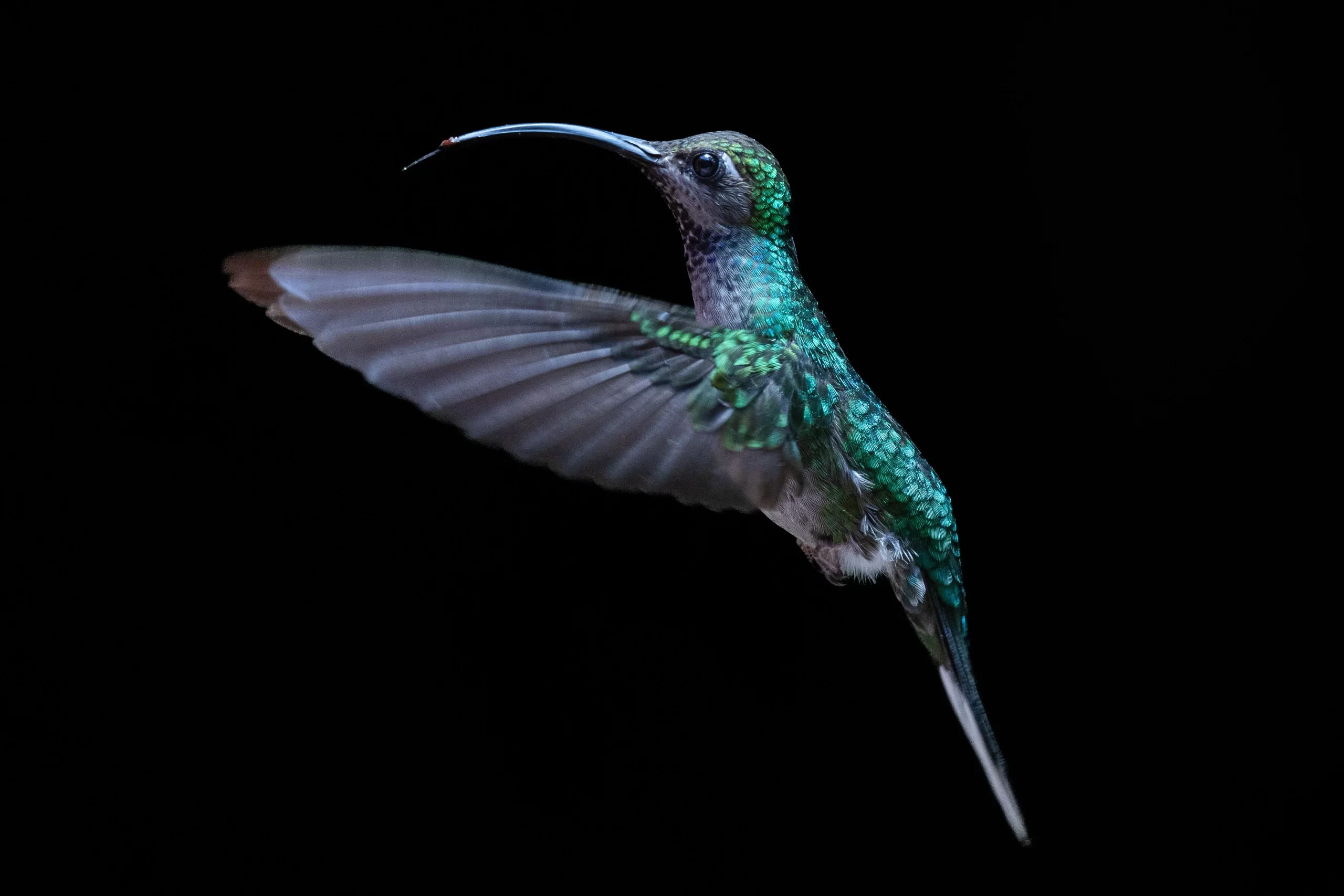Hummingbirds are beloved visitors to backyards during summers in the United States and Canada. Anyone who has observed a hummingbird knows that they are quite energetic birds, but where do hummingbirds go at night when it’s time to slow down?
Well, a hummingbird at night typically seeks out a sheltered, peaceful location in which it can sleep. Hummingbird mothers will sleep in their nests while they’re raising their young, while males will find a secluded branch on which to sleep. During the nonbreeding season, hummingbirds will locate a perch in a tree that offers them protection from predators and the elements.
Table of Contents
Okay, so hummingbirds sleep at night – big surprise. What do hummingbirds do at night aside from sleeping, though? Do hummingbirds fly at night?

Do Hummingbirds Fly At Night?
Those who have had the pleasure of observing hummingbirds know that these creatures have quite the appetites. This means they have to spend much of their days foraging for food. At times, it may seem like hummingbirds never stop eating. Some believe that they’ve observed hummingbirds flying around during the night to find a midnight snack, but is this true – do hummingbirds fly at night?
No, hummingbirds do not fly at night. At least, they do not fly in locations where people would be able to observe them. Hummingbirds may fly at night during migration, but humans would not be able to see such a tiny bird in the night sky. Hummingbirds will not fly around backyards and feed on nectar at night.
Moths That Look Like Hummingbirds
Now, you may be quite convinced that you saw something that looked like a hummingbird flying around at night. In fact, this creature may have even been visiting flowers and sipping on nectar. So, do hummingbirds fly at night after all?
No, hummingbirds do not visit flowers and feed during the night. If you think you saw a hummingbird at night, it was probably one of the many hummingbird look-alikes that exist. More specifically, you likely observed a moth of some type. Let’s review some of the moths that look like hummingbirds.
As it turns out, there are many moths that look like hummingbirds. These insects may even behave like the feathered creatures that visit your flowers during the day. Here are some of the most common hummingbird look-alikes:

Moths are primarily nocturnal unlike hummingbirds, and they share much of the same behaviors since they also love to drink nectar from flowers. Many moths that look like hummingbirds are just as big as these birds, and these insects can whir their wings with great speed just as hummingbirds can.
Therefore, if you witnessed a hummingbird-like creature sipping nectar from your garden at night, it was almost certainly a moth who was working the night shift rather than a hummingbird.
But why not hummingbirds – where do hummingbirds eat at night?
Do Hummingbirds Eat At Night?
Now that you know that moths have such great success with eating at night, you may be curious as to why hummingbirds can’t enjoy the same success at night. After all, it’s not as if the flowers and insects that hummingbirds love to eat disappear at night. So, do hummingbirds eat at night?
No, hummingbirds do not eat at night. While moths have a magnificent sense of smell to help them locate flowers at night, hummingbirds lack such a powerful olfactory system. Therefore, hummingbirds could never locate flowers like petunias that do not emit much of a scent. Moreover, hummingbirds do not have echolocation that could help them capture insect prey such as mosquitos.
So, where do hummingbirds go at night when they need a bite to eat? Answer: they don’t go anywhere, instead staying put at their sleeping perch until the following morning.
Speaking of slumber, where do hummingbirds sleep at night?
Where Do Hummingbirds Sleep At Night?
Hummingbirds expel immense amounts of energy during the day, so sleeping is vitally important for these tiny creatures. So where do hummingbirds go at night when they’re tired – where do hummingbirds sleep at night?
Well, hummingbirds are easy to please when it comes to finding a place to sleep. You see, they typically do not sleep for hours at a time like humans. Rather, these birds will engage in a series of short bouts of sleep. They will wake up routinely before falling back asleep. This behavior helps them to monitor their surroundings while ensuring that they get plenty of rest.
The exception to this sleeping pattern is when a hummingbird enters a state of torpor – a time in which they reduce many of their bodily functions to conserve energy. Hummingbirds will typically enter this state during times of cold weather when they have to conserve to help them survive the night.
Therefore, tree or shrub with plenty of cover from weather and predators is a good spot for sleeping hummingbirds. Also, remember that hummingbirds are unlike social birds like seagulls and geese who sleep in groups. Hummingbirds sleep by themselves.
Do Hummingbirds Migrate At Night?
Hummingbirds generally do not fly at night, but as many will know, most hummingbirds that breed in North America are migrants. So, come migration time, what do hummingbirds do at night – do hummingbirds migrate at night?
Yes, hummingbirds do migrate at night! This is generally considered to be the only time in which hummingbirds will fly at night. Though hummingbirds at night will fly in the darkness during their spring and fall migrations, don’t get your hopes up for seeing one of these migrating birds. Hummingbirds that fly at night are often a couple hundred feet up in the air. Picking out a tiny hummingbird against the dark sky would be nearly impossible.

Why Do Hummingbirds Migrate At Night?
Many hummingbird species don’t have a choice but to migrate at night. For instance, species such as the Ruby-throated Hummingbird may cross the Gulf of Mexico from the Yucatan Peninsula to southern Texas during migration.
Birds that undergo such an undertaking could certainly not make the trip during the waking hours of a day. It will take many hours of migrating in both daylight and nighttime to successfully pull off this journey.
For other species, it is most efficient to migrate during the night. Migrating at this time allows a hummingbird to fuel up on nectar during the day and participate in migration after doing so. This way, hummingbirds don’t have to waste daylight hours on migration. Moreover, birds have plenty of energy after feeding during the day.
Migrating in the darkness sounds intense; can hummingbirds see in the dark to help them on their journeys?
Can Hummingbirds See At Night?
Migrating at night sounds challenging and dangerous for a tiny bird such as a hummingbird. Can hummingbirds see at night to at least make the journey a bit safer?
Well, hummingbirds cannot navigate the night like owls and bats, however, they aren’t completely helpless in the dark. Hummingbirds use a variety of methods to help them navigate the darkness during migration, and their night vision tends to be comparable to human night vision.
So, can hummingbirds see in the dark? Answer: yes, they can see well enough to orient themselves during migration.
Are Hummingbirds Nocturnal?
There are hundreds of hummingbird species that exist throughout the Americas. Indeed, hummingbirds are a bird family that has tremendous diversity. Being a bird family with such incredible diversity, one would think that there would be at least one nocturnal hummingbird. Yes, some owls come out during the day despite these birds being labeled as nocturnal. Are there similar exceptions for hummingbirds – are hummingbirds nocturnal anywhere?
No, despite the superb diversity of the hummingbird family, there are no nocturnal hummingbird species. Remember, hummingbirds at night will migrate, but this does not make them nocturnal. Rather, hummingbirds are diurnal species that have evolved to take advantage of optimal nighttime migration conditions.
Why Aren’t Hummingbirds Nocturnal?
No one can dispute the remarkable maneuverability and grace with which a hummingbird flies. Indeed, hummingbirds can quickly pivot and change directions in an instant. Considering their astonishing flying skills, why doesn’t a nocturnal hummingbird exist?

Well, although hummingbirds are adept at flying, they are simply not evolved to navigate in the darkness. A hummingbird would feel vulnerable if it were to be flying around in someone’s yard at night. While they may have success with flying in artificially illuminated locations such as backyards, they would otherwise have a difficult time with flying at night.
How Can I See Hummingbirds Flying At Night?
Those who want to see a hummingbird at night may consider questions like, “Where do hummingbirds go at night?”. Alas, those who hope to see nighttime hummingbirds shouldn’t get their hopes too high. The only instances in which a hummingbird would be flying at night would be during their northward or southbound migrations. Migrating hummingbirds–like other migratory birds–fly high enough where they don’t run the risk of colliding with trees.
Thus, it would be impossible to view a tiny hummingbird at such a height against a dark sky. Birders will have a much better chance of observing one of these fast fliers during the day.
Conclusion
Before wrapping up this article about viewing a hummingbird at night, let’s review some of the main points that were made:
- Where do hummingbirds go at night?
- Hummingbirds seek out a quiet, secluded spot where they can sleep and remain safe from the elements and predators.
- Where do hummingbirds sleep?
- Hummingbirds sleep in trees or shrubs.
- Can hummingbirds see at night?
- Hummingbirds can see at night about as well as humans, so their night vision is somewhat limited.
- Are hummingbirds nocturnal?
- No, not a single hummingbird is nocturnal.
- Do hummingbirds come out at night?
- No, hummingbirds are inactive at night unless they’re migrating.

